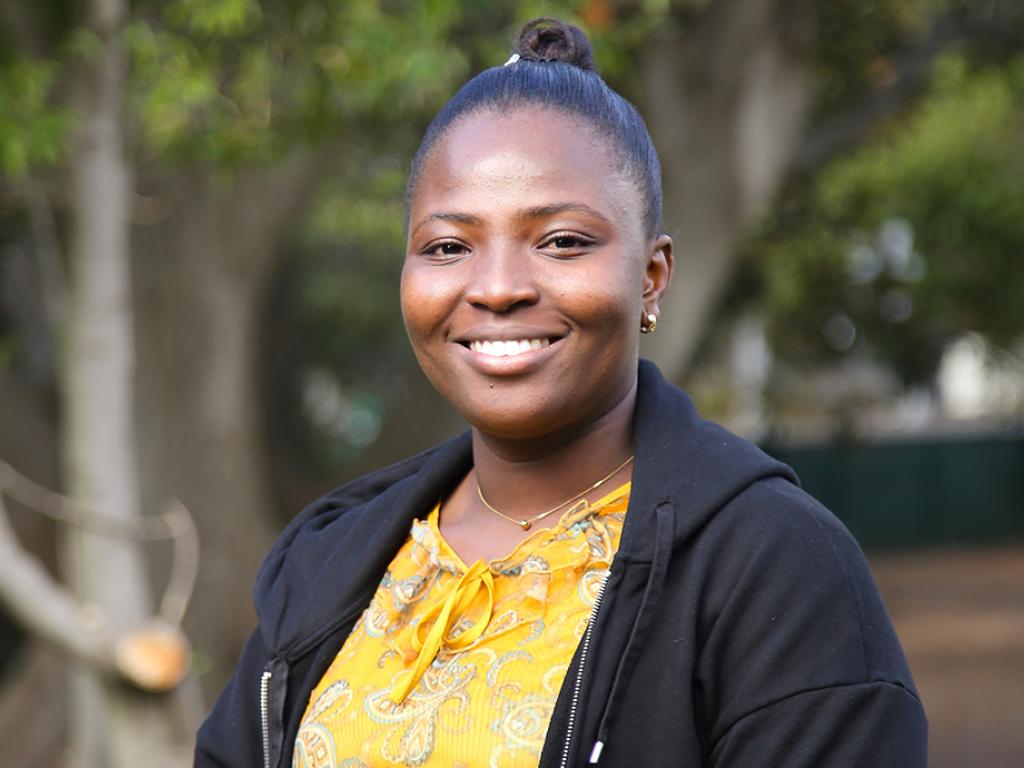Mastercard Foundation Scholar focuses on ways to alleviate climate change while giving back to society

Giving back to society is of key importance to Grace Emmanuella Adoteye, one of the current members of UCT’s Mastercard Foundation Scholars Program.
Despite losing her father during her undergraduate years, and having to work part-time to support her family, Grace has made it a priority to engage in community service programmes that can make a difference in people’s lives.
After graduating with a BSc (Hons) in Botany from the University of Ghana, Grace interned at Ghana’s Biotechnology and Nuclear Agriculture Research Institute, before enrolling at the University of Cape Town to study biological science, specialising in plant ecophysiology.
“In my country Ghana, over 60% of food crops are cultivated in regions where crop cultivation is hampered by water deficit and heat stress due to the high temperatures and erratic rainfall patterns present in these regions,” Grace says, explaining her choice of degree. “With global warming becoming a topical concern globally, crop production in these regions is expected to face more challenges with the expected rise in temperatures by 2050. As such, farmers in these regions are likely to suffer significant crop losses with the change in weather patterns which will essentially lead to food insecurity. This would also affect production in food processing companies and institutions that require food crops as the raw materials to operate.
“In essence, not only would job losses occur leading to higher rates of unemployment but also, the nation’s economy would be adversely affected. This programme will provide the requisite knowledge and skill set needed to carry out ground-breaking research that would enable me to contribute my quota towards mitigating these challenges and sustaining the production of crop plants in my country, Ghana.”
Throughout her studies, she has diligently dedicated time to community service projects, including Tech Era, a non-profit organisation that aims at empowering persons with disabilities through assistive technology.
“I worked with four young adults living with special needs. Amongst these four were three of my long-term students who are young adults living with autism. As part of my responsibilities, I helped in developing their communication and IT skills.”
During her undergraduate vacations, she worked as a volunteer teacher at her alma mater, Oda Senior High School. “I assisted a total of 180 year-12 students with their preparations for the West African Secondary School Certificate Examination. I was able to assist and guide the students in their applications to various universities, as well as their selection of programmes that suited their interests and future career goals.”
“Over the years, my experiences as a volunteer teacher brought to my attention how the lack of basic school materials and guidance could affect the output of students,” says Grace. As a result, she partnered with a friend to establish the Making Education a Possibility (MEP) Foundation in October 2019. This foundation seeks to provide basic school materials such as school uniforms and stationery to underprivileged pupils in marginalised communities as a way of helping them stay in school.
In their two-and-a-half years of operation, they have donated school uniforms, books, and stationery to 201 learners. They also offered over 90 hours of extra tuition to 12 final-year junior high school learners who had challenges with subjects such as Math and Science. MEP recruited volunteers in tertiary institutions who are first-generation students and/or from financially disadvantaged homes to serve as mentors who share their experiences with learners as a way of encouraging them to give their best towards their studies.
Currently at UCT, Grace volunteers for SHAWCO Education and the Golden Future Project, both organizations providing academic support to high school learners as a way of encouraging them to reach their full potential.
Being awarded the Mastercard Foundation Scholarship was more than just financial aid for Grace, to her it was a reward for all the hard work she had put into her studies. “I saw it as a validation that I have the potential to impact the future of our society and an honour to know there are people who believe in my capabilities. The scholarship also provides me with the opportunity to meet and interact with like-minded individuals who are changing the world in their little ways from whom I can learn and build up exemplary leadership qualities.”
Grace hopes to pursue doctoral studies which would provide the qualification needed, in combination with prior research experience, to become a professor and augment the teaching staff in her alma mater, the University of Ghana. “I want to share the knowledge gained over the years with the next generation while mentoring young climate change activists and scientists. Beyond this, my long-term goal is to establish a crop-improvement centre that will work on identifying and culturing crop plants that are tolerant to certain environmental stress factors.”
